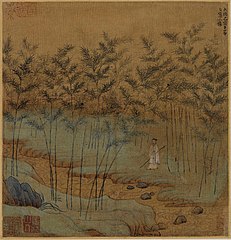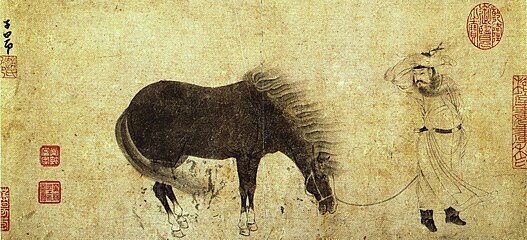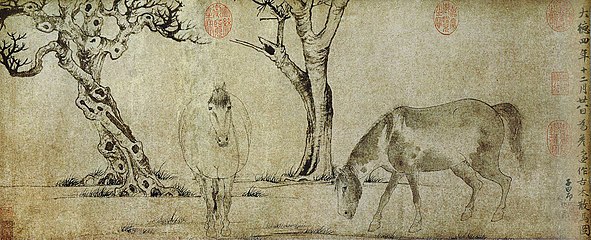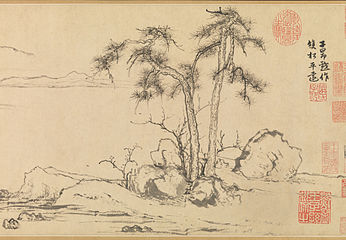art.wikisort.org - Artist
Zhao Mengfu (Chinese: 趙孟頫; pinyin: Zhào Mèngfǔ; Wade–Giles: Chao Meng-fu; courtesy name Zi'ang (子昂); pseudonyms Songxue (松雪, "Pine Snow"), Oubo (鷗波, "Gull Waves"), and Shuijing-gong Dao-ren (水精宮道人, "Master of the Water Spirits Palace"); 1254–1322), was a Chinese calligrapher, painter, and scholar during the Yuan dynasty.[1] He was a descendant of the Song dynasty's imperial family through Emperor Xiaozong's brother Zhao Bogui who married a lady surnamed Song who was the granddaughter of Emperor Huizong. Zhao Bogui was a descendant of Emperor Taizu, through his son Zhao Defang.
| Zhao Mengfu | |
|---|---|
 Portrait of Zhao Mengfu | |
| Born | 1254 |
| Died | 1322 |
| Spouse | Guan Daosheng |
| House | House of Zhao |
| Father | Zhao Yuyin |
| Occupation | Calligrapher, painter, scholar |
| Zhao Mengfu | |||||||||
|---|---|---|---|---|---|---|---|---|---|
| Traditional Chinese | 趙孟頫 | ||||||||
| Simplified Chinese | 赵孟𫖯 | ||||||||
| |||||||||
He was recommended by the Censor-in-chief Cheng Jufu to pay an audience with Kublai Khan in 1286 at the Yuan capital of Dadu, but was not awarded an important position in office. His work was however, greatly appreciated later by the Confucian-inspired Yuan Emperor Renzong. Zhao was a member of the "Academy of Worthies".[2]
He was married to Guan Daosheng, who was also an accomplished poet, painter and calligrapher. His rejection of the refined, gentle brushwork of his era in favour of the cruder style of the eighth century is considered to have brought about a revolution that created the modern Chinese landscape painting. He was known for his paintings of horses. His landscapes are also considered to be done in a style that focuses more on a literal laying of ground. Rather than organizing them in a foreground, middle ground, and background pattern he layers middle grounds at various heights to create a sense of depth. This pattern of organization makes his paintings appear very simple and approachable. It was this characteristic that so many people valued about his style.
One of his most celebrated landscape paintings is exhibited at the Princeton University Art Museum with the title “The Mind Landscape of Xie Youyu” (幼輿丘壑), an allusion to the nature-loving scholar-official Xie Youyu (280–322). However, in 2019 Dutch scholar Lennert Gesterkamp argued that the colophon attached to the painting and mentioning Xie Youyu is a forgery, and that in fact Zhao Mengfu's intention was to honor his own spiritual master, Daoist scholar Du Daojian (1237-1318), who also celebrated nature.[3]
Zhao Mengfu had several sons with his wife Guan Daosheng. His second son, Zhao Yong, also became a famous painter and calligrapher. He was also the maternal grandfather of Wang Meng, another famous painter. Zhao Mengfu was related to the later Ming dynasty literary figure Zhao Yiguang and his son Zhao Jun.[4]
Paintings
- Self portrait of Zhao Mengfu, 1299
- A Man and His Horse in the Wind
- Horse and Groom
- Elegant Rocks and Sparse Trees
- A Sheep and Goat
- Old Tree and Horses
- Hoopoe on Bamboo
- Twin Pines, Level Distance
Calligraphic works
Legacy
The former residence of Zhao Mengfu in Huzhou, Zhejiang province has been restored into a museum, and opened to public since 2012.
A 167 kilometer diameter crater on Mercury (132.4° west, 87.3° south) was named the "Chao Meng-Fu crater" in memorial of him.
Genealogy
- Zhao Kuangyin
- Zhao Defang
- Zhao Weixian
- Zhao Congyu
- Zhao Shijiang
- Zhao Linghua
- Zhao Zicheng
- Zhao Bogui
- Zhao Shichui
- Zhao Xiyan
- Zhao Yuyin
- Zhao Mengfu
See also
- Hanlin Academy
- House of Zhao
- Yuan poetry
References
- http://www.sino-platonic.org/complete/spp110_wuzong_emperor.pdf p. 15.
- Zhou Mi, translator Ankeney Weitz (January 2002). Zhou Mi's Record of Clouds and Mist Passing Before One's Eyes: An Annotated Translation. Vol. 2. Brill. p. 165. ISBN 90-0412605-8. Retrieved 5 March 2013.
{{cite book}}:|author=has generic name (help) - Lennert Gesterkamp, “《谢幼舆丘壑图》—— 漫谈赵孟頫与其道教绘画的问题 (The Mind Landscape of Xie Youyu: Discussing the Problem of Zhao Mengfu and his Daoist Paintings)”, in Wang Lianqi, ed., 王連起 (主編),《師古還是求新——趙孟頫的藝術與時代 (上下冊)》(Mastering the Past or Seeking the New: The Art and Times of Zhao Mengfu), Beijing: Renmin meishu chubanshe, 2019, 93–144.
- Marsha Smith Weidner (1988). Marsha Smith Weidner, Indianapolis Museum of Art (ed.). Views from Jade Terrace: Chinese women artists, 1300-1912 (illustrated ed.). Indianapolis Museum of Art. p. 31. ISBN 0-8478-1003-8. Retrieved 14 December 2011.
She married ZhaoJun, scion of an old Suzhou family, which traced its ancestry back to the imperial family of the Song dynasty and which counted among its sons the famous official and artist Zhao Mengfu (1254-1322). Zhao Jun's father was the recluse-scholar Zhao Yiguang (1559- 1625), and his mother was a daughter of Lu Shidao (1511-74), another Suzhou literatus. Zhao Jun studied the classics with Wen Congjian; thus a more permanent liaison between the two families was perhaps inevitable.
- Mu, Yiqin, "Zhao Mengfu". Encyclopedia of China (Arts Edition), 1st ed.
- Zhao Mengfu: Calligraphy and Painting for Khubilai's China
- Wang Lianqi, ed., 王連起 (主編),《師古還是求新——趙孟頫的藝術與時代 (上下冊)》(Mastering the Past or Seeking the New: The Art and Times of Zhao Mengfu), Beijing: Renmin meishu chubanshe, 2019.
- Li. The Autumn Colors on the Ch'iao and Hua Mountains: A Landscape by Chao Meng-Fu. 1965.
- Freer Gallery of Art, and Chu-Tsing Li. The Freer Sheep and Goat and Chao Meng-Fu's Horse Paintings. Artibus Asiae Publishers, Ascona, Switzerland, 1968.
External links
- Zhao Mengfu Calligraphy "Rhapsody on Goddess of Luo"
- Calligraphy Gallery of Zhao Mengfu at China Online Museum
- Painting Gallery of Zhao Mengfu at China Online Museum
- Works in the collection of the Metropolitan Museum, New York
- Landscapes Clear and Radiant: The Art of Wang Hui (1632-1717), an exhibition catalog from The Metropolitan Museum of Art (fully available online as PDF), which contains material on Zhao Mengfu (see index)
- Sung and Yuan paintings, an exhibition catalog from The Metropolitan Museum of Art Libraries (fully available online as PDF), which contains material on Zhao Mengfu (see list of paintings)
На других языках
[de] Zhao Mengfu
Zhao Mengfu (趙孟頫/赵孟頫, * 1254; † 1322) war ein chinesischer Maler der Song- und Yuan-Dynastie, der sich durch seine Fähigkeiten in chinesischer Malerei, chinesische Kalligrafie, Lyrik und Musik auszeichnete. Er ist aber auch vor allem bekannt für seine Pferdemalerei. Kublai Khan persönlich warb ihn 1286 für den hohen Staatsdienst an. Zur Zeit von Kaiser Buyantu Khan zählte er zum Kreis der einflussreichsten Persönlichkeiten bei Hofe. Zhao war als Nachkomme Kaiser Taizus in elfter Generation ein geborener Song-Prinz. Er beendete seine politische Karriere als Präsident der kaiserlichen Hanlin-Akademie.- [en] Zhao Mengfu
[es] Zhao Mengfu
Zhao Mengfu (en chino tradicional, 趙孟頫; en chino simplificado, 赵孟頫; pinyin, Zhào Mèngfǔ; Wade-Giles, Chao Meng-fu, 1254–1322) courtesy name Ziang (子昂), pseudónimos Songxue (松雪, "Pine Snow"), Oubo (鸥波, "Gull Waves"), y Shuijing-gong Dao-ren (水精宫道人, "Maestro del Palacio de Cristal"), es un príncipe y descendiente de la dinastía Song, y estudioso chino, pintor y calígrafo durante la dinastía Yuan.[fr] Zhao Mengfu
Zhao Mengfu, ou Chao Meng-fu, (Chinois : 趙孟頫 ; Pinyin : Zhào Mèngfǔ) (1254-1322) était un érudit chinois, peintre et calligraphe, durant la dynastie Yuan. C'est une figure majeure de l'art chinois.[it] Zhao Mengfu
Zhao Mengfu[1] (趙孟頫T, Zhào MèngfǔP, Chao Meng-FuW, zi: Zǐáng (子昂S); 1254 – 1322) è stato un pittore e calligrafo cinese, vissuto durante la dinastia Yuan.[ru] Чжао Мэнфу
Чжао Мэнфу — (кит. трад. 趙孟頫, упр. 赵孟俯, пиньинь Zhào Mèngfǔ; также Чжао Цзы-ан, прозвища: Оубо, Сунсюэ, Сунсюэ-даожэнь (Даос [из обители] Заснеженной сосны), Шуйцзингун, Шуйцзингун-даожэнь (Даос из Хрустального дворца), 1254—1322) — китайский художник, каллиграф, литератор и государственный деятель.Другой контент может иметь иную лицензию. Перед использованием материалов сайта WikiSort.org внимательно изучите правила лицензирования конкретных элементов наполнения сайта.
WikiSort.org - проект по пересортировке и дополнению контента Википедии
















